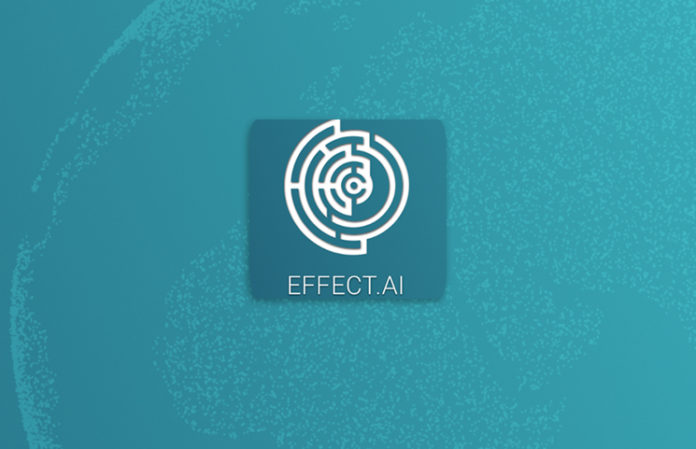According to a company announcement, Effect.AI will shift the development of The Effect Network, a decentralized network for Artificial Intelligence, from the NEO blockchain to the EOS blockchain late April 2019.
Effect.AI cites disappointment in the performance of the NEO technology and concerns about the lack of direction of NEO’s future as the major reasons for this decision. After exploring several other technologies, Effect.AI has selected the EOS blockchain as their first choice and are currently preparing for the move.
They have chosen EOS for its technologically advanced software, security and its above average transactions per second (TPS). The TPS of EOS is approximately 300 times higher then NEO and Ethereum.
By applying blockchain technology to AI, Effect.AI is creating an open and transparent platform that facilitates the development of – and access to AI algorithms much more effectively and democratically than ever before.
Effect.AI’s first platform, Effect Force, is the number one most used dApp on NEO, with over 2000 active registered users from over 91 countries making up their AI WorkForce. These users are actively tagging and structuring data necessary for AI development.
Over 1.8 million transactions of EFX (Effect.AI’s utility token) have been paid out to the WorkForce over the last few weeks. Some of the clients that are using the Effect Force platform for data annotations include organizations like ING, Daneel, Lobster Media, and the Singapore government.
Difficulties With NEO Blockchain
Effect.AI ran into problems while building on the NEO blockchain. They initially chose to build on NEO in November 2017 because of the free transactions, the promise of high transactions per second (TPS) in the near future and multiple programming languages for smart contracts.
However, the free transactions proved to be unsustainable as the NEO blockchain coped with multiple malicious spam attacks. The transactions per second remain at 14-22. This low TPS is a problem as the NEO blockchain was unable to cope with even the first day of 200,000 EFX transactions at the launch of Effect Force.
Furthermore, NEO announced their NEO 3.0 update, a potential reboot from the genesis block. The rollout of NEO 3.0 is still unclear but if a full reboot is the chosen path, NEO projects will have to migrate from the current iteration of NEO 2.X to this “new” blockchain.
EOS – A Better Alternative For Building Our Artificial Intelligence Solution
The release of the EOS blockchain provides Effect.AI with a more robust alternative. Effect.AI announces the move to EOS for reasons such as it being more scalable and secure, easy to iterate upon, technologically advanced, and have a great ecosystem.

A move is necessary since they want to facilitate over a million daily transactions by the end of 2019, which can already be achieved with the EOS blockchain. Effect.AI has been in close contact with Block.one and valuable contributors from the EOS community to facilitate the move to EOS.
The connection of Effect.AI and EOS came after the founders of Effect.AI were invited to the EOS hackathon in London last year to participate as mentors and meet the community. Effect.AI CEO Chris Dawe ended up winning the MVM “Most Valuable Mentor” award at the hackathon.
The migration of the EFX token and project development is set for late April 2019.
Furthermore, Effect.AI is collaborating with the UN to create Social Impact Hubs in developing countries. Working with the UN in the country of Georgia, 12 citizens are performing tasks on Effect Force as part of a pilot project to create work in developing countries.
Effect.AI aims to have 4 Social Impact Hub facilities up and running by the end of 2019. As a part of this program, Effect.AI is working to encourage and foster community and developer growth in Georgia.
Jesse Eisses, CTO of Effect.AI said:
NEO has been a good blockchain to launch our initial product on and we have used it to facilitate millions of data annotations. Since then NEO has been put to the test and the current implementation of the blockchain can’t get to the promised transaction throughput and the smart contract compilers besides C# are still immature. These factors combined with the mainnetrelease of EOS have been an important factor in our decision to migrate.
Chris Dawe, CEO of Effect.AI said:
The Effect Network cannot be built on a blockchain of uncertainty. Effect.AI and the project are blockchain agnostic and we will always continue to look for technology that is most suited to the robust nature of this network. Our entire team sees that EOS is well ahead of most other projects in the space, on a technological, mass adoption, and community level. These are the three main aspects we or anyone else should look for when looking at a blockchain. We’re really excited to join the EOS family and to get to work on the future of Artificial Intelligence.
Effect.AI is partnered with DAIA (Decentralized AI Alliance), an alliance of serious participants in the AI & blockchain related ecosystems such as SingularityNET, Ocean Protocol and Deep Brain Chain, coming together to collectively solve common challenges and create an amazing future.
Effect.AI is working closely with advisor Charlie Shrem, Sally Eaves and the UN to start Social Impact Hubs in developing nations.
- Crypto Price Update July 24: BTC Maintains $66K, ETH at $3.4K, XRP, TON, and ADA Rallies
- Bitcoin Falls to $65K as Mt. Gox Transfers $2.8 Billion BTC to External Wallet
- News of Marathon Digital’s $138 Million Fine for Breach of Non-Disclosure Agreement Triggers a Bearish 2.5% of Its MARA Stock
- Are $530M Bitcoin ETF Inflows a Blessing or Caution?
- Metaplanet Teams with Hoseki for Real-Time Bitcoin Holdings Verification
- Building Secure Blockchain Systems: An Exclusive Interview with ARPA and Bella Protocol CEO Felix Xu
- Building The “De-Facto Crypto Trading Terminal”: An Exclusive Interview with Aurox CEO Giorgi Khazaradze
- Building a New Global Financial System: An Exclusive Interview With Tyler Wallace, Analytics Head at TrustToken
- “Solana is the Promised Land for Blockchain” — An Exclusive Interview with Solend Founder Rooter
- El Salvador: Where The Bitcoin Revolution Begins With A Legal Tender

 Why Trust Us
Why Trust Us







